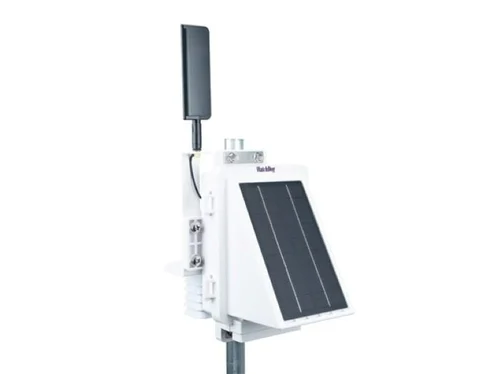WatchDog 3210 Temp RH Station Data Recorder
₹1.2
Product DescriptionWatchDog 3210 Wireless Temperature Alert StationProtect your crops by warning of frost or high temperature conditions that require immediate action.
The fully integrated WatchDog 3210 Wireless Temperature Alert Station measures temperature and humidity, recording and communicating the data to the cloud using its internal modem or radio.
Receive alerts via automated phone call, text message, and/or email immediately when temperature crosses your selected threshold – no waiting for the next scheduled upload.
-
Integrated Solar Power system for reliable power.
-
Integrated Modem/Radio for reliable communications: available with a choice of cellular modems or other radios.
-
Integrated Data Logger protects your data. Holds over 18 months of data at a 15-minute recording interval. Data can be transferred to a USB flash drive.
-
Easy to install – be running in minutes. Mounts to a 1.25 inch mast. U-bolts included.
-
Bluetooth connectivity to your Apple or Android smartphone running the free WatchDog Mobile App speeds setup and displays current conditions.
-
Sends data to the SpecConnect Cloud Solution – View current conditions or historical data using a broad selection of analytical reports from anywhere in the world.
-
Customizable with plug-in sensors to meet your needs
-
Receive the latest changes with over-the-air updates (also available via a USB flash drive).
-
The durable enclosure provides moisture, corrosion, and UV protection for increased reliability in harsh environments.
-
Designed and manufactured in the USA to provide the quality data you can rely on.
Communication Options
- Item 3210MU has an LTE-M cellular modem, providing LTE CAT-M1 and NB-IoT communications. Requires SpecConnect subscription.
- Item 3210HU has a 3G/HSPA+ cellular modem. Requires SpecConnect subscription. (Not for use in the USA)
You must be logged in to post a review.
Q & A
Weather stations play a crucial role in promoting sustainability in farming. By providing accurate and up-to-date weather data, they enable farmers to make informed decisions about irrigation, crop selection, pest management, and other agricultural practices. Here are some ways weather stations contribute to sustainable farming:
Efficient Resource Management: Weather stations help farmers optimize their resource usage. By monitoring weather conditions, farmers can determine when to irrigate crops based on actual need, reducing water waste. They can also adjust fertilizer application based on rainfall data, minimizing nutrient runoff and potential environmental harm.
Crop Planning and Protection: Weather stations assist in crop planning and protection, leading to sustainable agriculture. They provide information about temperature, humidity, wind speed, and precipitation patterns, allowing farmers to choose suitable crops and plan planting schedules accordingly. By anticipating extreme weather events, farmers can take preventive measures to protect their crops, reducing losses and ensuring long-term sustainability.
Disease and Pest Management: Weather stations aid in disease and pest management. Certain weather conditions favor the growth and spread of pests and diseases. With accurate weather data, farmers can predict disease outbreaks and pest infestations, enabling them to apply targeted and timely interventions. This reduces the reliance on chemical pesticides and promotes more sustainable pest management practices.
Energy Conservation: Weather stations help optimize energy usage on farms. For example, they can monitor solar radiation levels to determine the ideal timing for deploying solar-powered irrigation systems. By aligning energy-intensive activities with periods of maximum sunlight, farmers can reduce their reliance on fossil fuel-based energy sources, leading to lower carbon emissions and greater sustainability.
Climate Change Adaptation: Weather stations are essential tools for monitoring and adapting to climate change. As weather patterns shift and become more unpredictable, farmers need accurate and real-time weather information to adjust their farming practices accordingly. Weather stations provide the necessary data to implement climate-smart strategies, such as altering planting dates, adjusting irrigation schedules, or adopting new crop varieties suitable for changing conditions.
Overall, weather stations are vital for promoting sustainable farming practices. They empower farmers with actionable information to optimize resource usage, mitigate risks, and adapt to changing climatic conditions. By integrating weather station data into their decision-making processes, farmers can reduce environmental impacts, enhance productivity, and contribute to the long-term sustainability of agriculture.
General Inquiries
There are no inquiries yet.

















Reviews
There are no reviews yet.